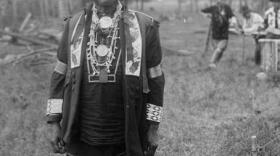For this week's A Northwoods Moment in History, Gary Entz tells us about the incredible journey of Thomas O’Brien in 1913.
In 1913 Thomas O’Brien was just on ordinary resident of Rhinelander. While his brother John O’Brien was a respected member of the Rhinelander Police Department and served his community honorably, it was the younger brother Thomas who did something remarkable. Thomas O’Brien undertook an incredible journey that few people even today would dare attempt.
Thomas O’Brien was a young man who suffered a devastating stroke sometime around 1911. The entire left side of his body was paralyzed, and medical treatment of the day could do little to help him. O’Brien asked his doctors what therapy he should seek, and they advised him to move out west. Move to the Northwest, enter a spa, and take in the coastal air was their advice. O’Brien followed their guidance. In 1912 he took what savings he had, boarded a train, and moved to Portland, Oregon.
The change of climate did nothing, and O’Brien remained paralyzed on his left side. Out of money and frustrated with the lack of progress he was making, O’Brien decided to undertake a cure of his own. He checked out of the spa, gathered a bed roll, a change of clothing, and other necessities in a small backpack, and started walking in the general direction of Rhinelander. When he left Portland on March 9, he had the princely sum of five cents in his pocket.
There were no real roads or highways in those days, so O’Brien followed the tracks of the Chicago, Milwaukee, and Puget Sound Railroad. At the time of his departure, O’Brien could move his right foot with difficulty and had to drag his left foot behind. He forced himself forward, and as the days and weeks progressed his limbs became stronger. The ability to move slowly began to return.
O’Brien was a proud man and refused to beg or seek sympathy for his plight. Each time he reached a town or village he sought out the mayor or other official and asked if there was work for him. He would linger in each town for a few days, earn a little cash, then move onward. In towns where there was no work, he appealed to local law enforcement to let him sleep in a cell for the night, but never did he ask for a handout. In some instances, he went two days with no food.
On June 13, 1913, Thomas O’Brien reached Auburndale, Wisconsin, nearly cured of his paralysis. His Rhinelander relatives picked him up and drove him the rest of the way home. O’Brien had two pairs of shoes recobbled on his journey, but he wasn’t done yet. He was so inspired by his walk that he announced he would continue the journey, from Rhinelander to New York City. On August 18, O’Brien gathered his knapsack and departed for New York.
This story was written by Gary Entz and produced for radio by Mackenzie Martin. Some music for this commentary came Podington Bear. The photo above is used with permisson from the Wisconsin Historical Society and can be found on their website here.
A Northwoods Moment in History is funded in part by a grant from the Wisconsin Humanities Council, with funds from the National Endowment for the Humanities and the State of Wisconsin. Any views, findings, conclusions or recommendations expressed in this project do not necessarily represent those of the National Endowment for the Humanities. The Wisconsin Humanities Council supports and creates programs that use history, culture, and discussion to strengthen community life for everyone in Wisconsin.







